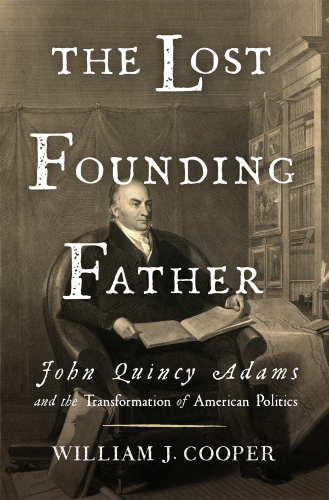
The Lost Founding Father
John Quincy Adams and the Transformation of American Politics
کتاب های مرتبط
- اطلاعات
- نقد و بررسی
- دیدگاه کاربران
نقد و بررسی

July 15, 2017
A biography focused on a statesman's career during a period of profound political change.With at least five books about John Quincy Adams (1767-1848) published in the last five years, it's difficult to accept the idea that Adams has been "lost" to history. Among those books were two comprehensive biographies by Fred Kaplan and James Traub, an examination of Adams' education, and a perceptive biography of his wife, Louisa, in which, of course, Adams himself was an omnipresent character. Cooper (Emeritus, History/Louisiana State Univ.; Jefferson Davis and the Civil War Era, 2008, etc.) distinguishes his biography by focusing on "the context of the developing forces and changing values taking place in American politics during his lifetime," which Adams "both embraced and resisted." With this aim, the author pays little attention to his subject's marriage (Louisa, portrayed as sickly, is pushed to the background) or family (the death--possibly suicide--of his dissolute son George, for example, is dispatched in a paragraph). Like other biographers, Cooper portrays Adams as stubborn, ambitious, and a "patrician intellectual" who disdained calling public attention to himself--even by campaigning for office--and was happiest keeping his voluminous diaries. After a career as a statesman, he acceded to the presidency but, like his father, was not re-elected to a second term. He watched with dismay the rise of Andrew Jackson, whom he considered corrupt, ignorant, and opposed to the "energetic federal government" that Adams championed. Jackson's election, Cooper asserts, "signaled the beginning of a popular politics buttressed by organized, vigorous political parties." The author astutely traces Adams' connection to two rising factions, the Antimasons and Whigs, and, as a congressman, his efforts to halt slavery, which he believed could be accomplished through "a gradual, ordered process." He struggled with his alignment with abolitionists, fearing that their cause might "ruin him politically," but he eventually concluded that slavery would not be purged from the Union "until it goes down in blood." A thorough but not groundbreaking biographical investigation.
COPYRIGHT(2017) Kirkus Reviews, ALL RIGHTS RESERVED.

August 7, 2017
Cooper, professor emeritus of history at LSU and winner of the 2000 Los Angeles Times book prize for Jefferson Davis, American, explores the life of John Quincy Adams, America’s sixth president, who after his presidency served 17 years in Congress. Cooper begins with Adams’s achievements as secretary of state under Pres. James Monroe, which included Adams’s authorship of the enduring Monroe Doctrine and central role in the 1819 Adams-Onís Treaty through which the U.S. gained Florida as well as territory from the Rocky Mountains to the Pacific. Adams’s presidency was unsuccessful in comparison and Cooper closely analyzes the growing populism and political polarization that presaged Adams’s defeat by Andrew Jackson in the 1828 presidential election. Adams’s subsequent tenure in Congress was distinguished, however, and Cooper sympathetically highlights Adams’s opposition to the spread of slavery in the face of the era’s territorial expansion, which included the annexation of Texas, the Mexican-American War, and the settling of an expansive border for the Oregon territory. Cooper also details Adams’s dramatic Supreme Court argument in the historic Amistad case, which gained the freedom of Africans who had revolted while being transported on a Spanish slave ship. Cooper’s balanced, well-sourced, and accessible work focuses on a rarely examined yet pivotal period in American history.

October 1, 2017
Award-winning author Cooper (history, Louisiana State Univ.; Jefferson Davis, American) illuminates the character of John Quincy Adams (1767-1848) as different from his political peers, shedding light on his influence on early American politics. The son of former president John Adams, John Quincy spent his formative years in Europe studying the Enlightenment while men such as Andrew Jackson, who defeated incumbent John Quincy in the presidential election of 1828, grew up along the American frontier. Chapters follow Adams's upbringing, his hesitancies about entering politics, and the personal circumstances that affected him throughout his journey. Readers receive a candid view into his marriage to wife Louisa and his constant anxiety about his ability to perform in each of the roles that called to him. VERDICT With several recent comprehensive biographies of Adams already available, Cooper's monograph is not exceptionally groundbreaking. However, it will be of importance to readers interested in the rise of American political parties, the national expansion and political reforms of the early 19th century, and the emerging sectional discord between North and South.--Rachel Koenig, Virginia Commonwealth Univ. Libs.
Copyright 2017 Library Journal, LLC Used with permission.

October 1, 2017
John Quincy Adams was not one of our Founding Fathers. Yet he knew and interacted with them, including his father John. Given his wide and lengthy political and diplomatic experience, he seemed exceptionally well-prepared when he was elected president in 1824. But his administration had few accomplishments, and he lost his bid for reelection to Andrew Jackson in 1828. Cooper (We Have the War upon Us, 2012) presents a narrowly focused biography that strives to place Adams' political career within the context of the rapidly changing social and political milieu of the 1820s, which saw vastly increased suffrage for white males and increased popular participation in politics. For a New England patrician like Adams, this was distasteful and even dangerous. He viewed political campaigning and populism as akin to mob rule. He viewed Jackson as the mob's standard bearer, and he hated him for it. With his stiff, reticent personality, Adams couldn't adapt, yet, Cooper argues, he was subsequently an effective congressman. This is a well-executed and useful reexamination of Adams' long public service career.(Reprinted with permission of Booklist, copyright 2017, American Library Association.)

























دیدگاه کاربران